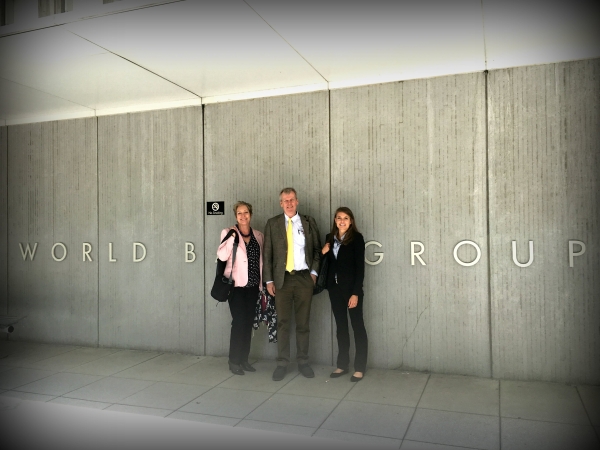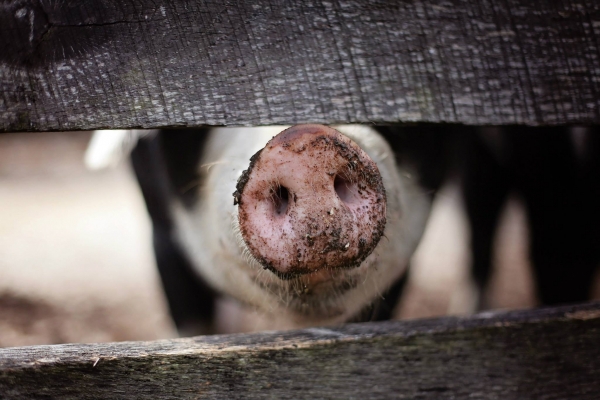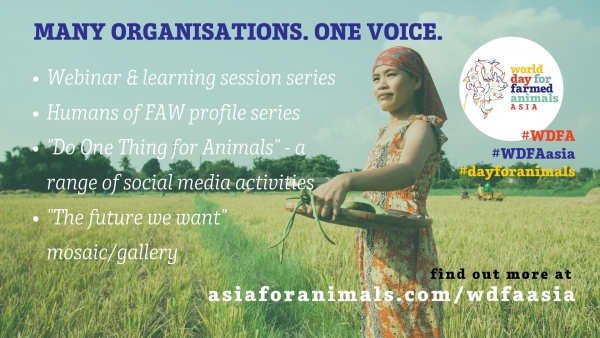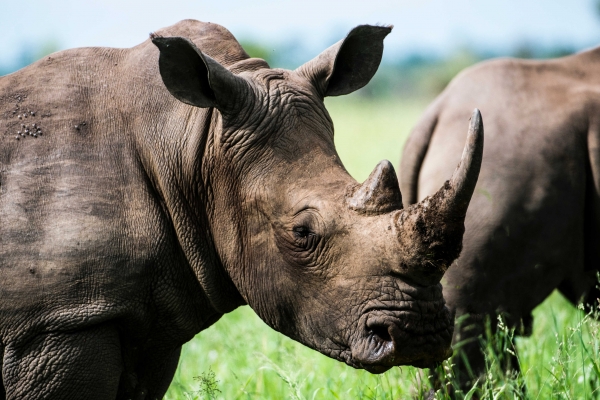
Animal Protection Consortiums and Collaboration: Networks, Alliances, Coalitions and Federations

World Animal Net (WAN) - 1997
WAN was established to improve communication and coordination among the world's animal protection groups. Today WAN is the world's largest network of animal protection societies with over 3,000 affiliates in more than 100 countries. WAN’s aim is to focus the animal protection movement and strengthen the impact of key animal advocacy efforts. All WAN’s activities are guided by its four original aims:
- Avoid duplication and competition
- Promote innovative programs
- Share information and expertise
- Stimulate cooperation and coalition building
Positives:
- WAN Directory - which facilitates contacts between animal protection organizations.
- Provision of well-researched information and expertise, easily accessible and free-of-charge.
- Offering advice, guidance and contacts.
- Strategic and well-organized, but non-bureaucratic.
ACT Asia
ACT Asia has played an important role in supporting Chinese animal protection groups to learn and share experiences through training, sharing of ‘best practice’, and information and advice. They supported the building of an alliance of groups across China (AAC), with the aim of providing a platform for animal protection groups to obtain information, share resources, and take joint action on issues when necessary.
The network’s objectives are:
- Training and development of China's animal protection organizations.
- Provide a platform for Chinese and international groups to interact and to share information and resources.
- Provide a platform to support Chinese animal protection groups with their individual projects.
- Promote animal welfare at a national level.
- Apart from the development of a web site, a major task for the network over the coming year will be the sourcing, translation, and distribution of resources, and partnering ACT Asia in its national campaign.
Positives:
- Experienced international expertise
- Thorough research and analysis
- Chinese connections and in-depth knowledge of subjects
- Animal protection training and development
- Provision of resources and information
Chinese Animal Protection Network (CAPN) - 2004
CAPN is a non-profit animal protection organization, and the first Chinese network for animal protection. Its first project ('Chinese Companion Animal Protection Network') was launched back in 2004, and since then it has covered a variety of animal protection issues. The work of CAPN has expanded rapidly, and it now reaches almost all parts of China, and it has more than 200 partner groups around world.
Positives:
- CAPN was founded by native Chinese people, which include dedicated Chinese activists
- CAPN has increased unity in the Chinese movement.
- It has moved the status of animal protection work onto a science-based footing amongst the animal protection community.
- It has tackled some difficult issues, such as cat and dog eating.
Asian Animal Protection Network (AAPN)
AAPN aimed to develop intra-regional cooperation and provide an entry point for enquiries from other regions. It is a loose, cost-effective network for exchanging information and ideas and general mutual support. A wide variety of issues were covered.
Education/awareness was the prime focus - sharing information, news, published material etc.
Positives:
- Provided much-needed information and support for the development of the Asian animal protection movement in earlier days.
Swedish Animal Protection Network
Animal Protection Network is a Swedish non-profit organization, founded in Stockholm, in 2004. The mission statement is to end the abuse and slaughter of cats and dogs in Asia, especially the different ways in which cats and dogs are tortured before being killed for the purpose of consumption or to be used as fur. The network supports a number of projects in Asia.
Positives:
- Animal Protection Network is able to raise funds from its Swedish members for Asian animal rights organization's local operations.
- The network does not have any staff located in Asia. All the actual work on site is performed by Asian nationals working in their own country.
The Animal Welfare Network Nepal (AWNN) - 2008
AWNN was established to increase the effectiveness and interaction of animal welfare organizations in Nepal. Its objectives are:
- Coordinate the activities of animal welfare organizations
- Raise awareness on animal welfare issues among the public
- Lobby and advocate for animal rights
- Promote stray dog adoptions
- Provide education and support to its members
Positives:
- National networking and coordination.
- Education and support for members.
The Transatlantic Animal Welfare Council (TAWC) - 2010
TAWC was set up to share information and respond to developments in animal welfare-related transatlantic issues and to foster further bonds of cooperation between European and US-based animal protection organizations. It was the intention to represent the interests of animal welfare in the stakeholder dialogue, creating (insofar as possible) a unified transatlantic animal welfare voice, especially on trade deliberations.
TAWC was originally set up to facilitate an informal exchange of information between animal welfare organizations, free of any obligations. Since then, it evolved into a formalized lobbying organization, issuing position statements and speaking on behalf of its constituent members. However, some now want TAWC to revert to a ‘mechanism for informal exchange of information’, which will mean ‘no shared policy statements’ (unless the organizations around the table all want and agree to that). This will mean reversion to a network.
Positives:
- Sharing of knowledge and expertise about a highly technical and politically charged process.
- Formulation of common positions among the world's leading animal protection groups.

Federation of Indian Animal Protection Organisations (FIAPO)
FIAPO is a collective of animal protection organizations in India. FIAPO represents and advocates for Indian animal protectionists; and also independently conducts research about and advocates for animals.
FIAPO was conceived at the 2007 Asia for Animals Conference, where Indian activists who realized the importance of working together towards a common cause decided to work towards setting up FIAPO.
FIAPO's main aim is to help connect and inform animal protection organizations and activists across India. It also undertakes campaigns on issues which are not yet well covered in India, then as work develops by existing (or new) organizations, FIAPO serves as a support structure. The aim is to strengthen animal protection by strengthening organizations themselves; not to become an ‘alternative’ to existing organizations but on the contrary, to be an expression of their strength and an amalgam of their collective expertise and passion.
FIAPO’s work covers a large number of campaigns. It also carries out ‘movement building’ programs
Positives:
- Building and strengthening the movement in India.
- Supportive and collaborative, not competitive.
- Carries out research
Eurogroup for Animals - 1980
Eurogroup for Animals is a federation of 40 like-minded organizations that can mobilize millions of citizens across Europe. It has represented its member organizations for more than 30 years.
Eurogroup for Animals is the leading animal protection lobby at European Union level. It is recognized by the European Parliament and Commission and represents animal welfare interests on many EU advisory committees and consultation bodies. It is recognized for its expertise and professionalism, making it a respected partner and advisor which:
- Promotes best practices in livestock production so that the millions of farm animal are spared avoidable suffering on farm, in transport and at the time of slaughter.
- Works with retailers and food producers to ensure policies and products are continuously introduced which significantly improve the way farm animals are kept for food.
- Accelerates the uptake of alternative test methods changing the focus from animal tests to more humane and more reliable non-animal methods.
- Creates strong alliances with stakeholders to introduce change in culture and policies on animal welfare.
Positives:
- In-depth knowledge and experience of EU political processes.
- Connections to European policy-makers and systems (e.g. Intergroup on the Welfare and Conservation of Animals).
- Proactive lobbying, plus watching brief.
- Excellent research and communications.
Global Federation of Animal Sanctuaries (GFAS)/ Captive Wild Animal Protection Campaign (CWAPC)
GFAS is an organization with the sole purpose of strengthening and supporting the work of animal sanctuaries worldwide. Its work includes the accreditation of bona fide sanctuaries.
The Captive Wild Animal Protection Campaign (CWAPC) was originally founded as the Captive Wild Animal Protection Coalition in 2002 to address the issues surrounding the growing US trade in captive wildlife. At that time, the coalition was comprised of expert individuals from key zoos, sanctuaries, and animal protection groups. In 2009, the CWAPC became a program of the Global Federation of Animal Sanctuaries, and its name was changed to the Captive Wild Animal Protection Campaign.
Positives:
- Development and sharing of best practice and expertise.
- The establishment of standards and guidance.
- Public awareness of the different standards and credentials of sanctuaries.
Animals Australia - 1980
Animals Australia is Australia's foremost national animal protection organization, representing some 40 member societies and thousands of individual supporters. Animals Australia has an excellent track record in investigating and exposing animal cruelty and for conducting ground-breaking strategic public awareness campaigns.
Founders Professor Peter Singer and Mrs. Christine Townend recognized the need to unite the many animal protection groups in Australia and New Zealand to provide a united and strong voice on behalf of animals. A primary activity was lobbying for, and then actively contributing to, the Senate Select Committee on Animal Welfare. In the late 1990s, it reverted to Australian groups only, and the name 'Animals Australia' was adopted.
The organization now uniquely undertakes two interwoven roles … as a peak body representing a large number of grass roots groups, and a campaign-focused organization working to raise community awareness of animal suffering and promote reform.
Positives:
- Excellent investigations.
- Strategic campaigning.
- United movement across large country.
- Dedicated and effective staff.

SPCA Movement
The RSPCA is based in the UK, but also carries out international work with partner organizations. It originated in 1824, and has been emulated throughout the world (particularly in former colonies).
The NSPCA was founded in 1956 as the Federation of SPCAs, and is the umbrella body for 97 societies situated throughout the Republic of South Africa. The SPCA movement has linkages with other SPCAs throughout the world, and carries out widespread hands-on programs (in particular, but not limited to, companion animal programs).
Positives:
- Massive experience and expertise in practical animal welfare work.
- Providing training, information and expertise for SPCAs across the world
- Project and program support.
Global March Movement
World Animal Day
Global March for Lions
March Against Canned Hunting
A movement for collaborative campaigning which started as a volunteer-run campaign – with marches and events for the protection of wildlife and against circuses, rapidly becoming a global phenomenon – with the Global March for Lions taking place in 62 cities across the world (15 March 2014). This group is now organizing a World Animal Day march for October 2014 (with PAAWA and WAN), with the theme: ‘Animals Matter to Africa!’ It was to be pan-African, but is already spreading across the globe.
This is not a formal collaboration, but a group of highly dedicated volunteers who are using social media to spread the campaigns of other groups through collective action.
Positives:
- Highly committed and dedicated organizing team.
- Activists - action-oriented, with minimal bureaucracy.
- Adding to the efforts of other formal organizations.
- Effectively using social media to mobilize.

European Coalition to End Animal Experiments (ECEAE)(1990 - cosmetic testing)
ECEAE was formed by organizations across Europe to successfully campaign to ban cosmetics testing on animals. Today it advocates on all animal testing issues in Europe. The ECEAE pulls together extensive expertise, experience and knowledge from major European animal protection organizations. It work with Members of the European Parliament (MEPs) and officials to ensure that animals in laboratories are high on the European political agenda, and carries out imaginative campaigning. It also runs public education campaigns and works with companies to encourage them to go cruelty free.
Positives:
- Integrated campaign/lobby
- Work based on investigations, thorough research and science.
- Opinion polls
- Imaginative and media-attractive campaigns – at EU and national levels
European Network for Farm Animal Protection (ENFAP)(1993, as a coalition - battery cages, and then the European Coalition for Farm Animals)
The European Coalition for Farm Animals (ECFA) was a pan-European coalition, consisting of 30 animal welfare groups in 25 different countries, established by CIWF. ECFA advocacy linked professional lobbying with creative and imaginative campaigning – developing a powerful, collaborative force for change. It was changed into the European Network for Farm Animal Protection (ENFAP) in 2013, and is now a collaboration of animal protection groups from across Europe working together to advocate for improvements in farm animal welfare.
Positives:
- Strategic Advocacy – planned pathways to eventual goals, and strict prioritization of issues.
- Integrated research/investigation/report/campaign/lobby.
- Imaginative campaigning – good use of celebrities and media opportunities.
- Campaigns – EU and national levels.
International Companion Animal Management Coalition (ICAM)
ICAM was established to support the development and use of humane and effective companion animal population management worldwide. Based on ICAM's emphasis on information sharing, ICAM could also be considered a network. Its goals are:
- To share ideas and data.
- To discuss issues relevant to population management and welfare.
- To agree definitions and hence improve understanding.
- To provide guidance as a collegial and cohesive group.
Positives:
- Excellent resources, guidance and expertise
- Sharing 'best practices'
Species Survival Network (SSN) - 1992
SSN is an international coalition of over eighty non-governmental organizations (NGOs) committed to the promotion, enhancement, and strict enforcement of the Convention on International Trade in Endangered Species of Wild Fauna and Flora (CITES). Through scientific and legal research, education and advocacy, the SSN is working to prevent over-exploitation of animals and plants due to international trade.
The SSN coordinates the activities of conservation, environmental and animal protection organizations around the world to secure CITES protection for plants and animals affected by international trade. Its work includes education and outreach to provide organizations from around the world with the information they need to participate in the CITES process.
SSN's legal and scientific research and analysis provide CITES Parties and the general public with the information they can use to better understand the proposals and resolutions considered for adoption by the Parties and the impact that their decisions may have on the survival of species.
Positives:
- Legal and scientific research.
- A platform which facilitates representation and input at CITES.
- Working groups on key species include global expertise and advice.
Fur Free Alliance
FFA is an international coalition of animal protection organizations working to bring an end to the exploitation and killing of animals for their fur. It seeks to bring an end to the killing and exploitation of all animals for their fur by raising public awareness about the cruelty and negative environmental impacts associated with the global fur trade.
It plans to achieve these aims by:
- Informing the public about the substantial animal suffering caused by the fur industry.
- Advancing legislative actions and in-depth investigations as needed.
- Targeting consumers and the fashion industry to encourage readily available alternatives.
- Working nationally and internationally through joint or individual campaigns.
Positives:
- Collaborative advocacy on an issue of shared concern.
- In-depth investigations.
- Public awareness.
- National and international campaigns.
International Coalition for Animal Welfare (ICFAW) - 2001
ICFAW was formed to represent non-governmental animal welfare organizations from across the world at the World Organization for Animal Health (OIE). It is composed of organizations that share the primary objectives of preventing cruelty to animals and relieving their suffering (albeit that they use different strategies depending on the nature of the task, and the region and country in which they work).
The coalition plays an important role in the OIE in four ways:
- They contribute to the decision-making process in drawing up guidelines by having experts on the working groups, and offering comments, advice and information.
- An expert from one of ICFAW member organizations is a member of the OIE working group on animal welfare.
- ICFAW members work in over 150 countries worldwide raising standards of animal welfare and assisting in implementing the agreed OIE guidelines through training, technology transfer and grant aided funds. [An overview of this work was presented to the OIE General assembly in May 2009.]
- The coalition produces position statements on issues such as private standards or chickens bred for meat
The member organizations of ICFAW have together hundreds of years of experience in dealing with animal welfare, work in 150 countries worldwide, employ over 2,000 members of staff including over a hundred scientists and veterinarians and have millions of supporters. They work on all the issues on which the OIE is drawing up guidelines (wildlife, companion animals, animals used for scientific purposes and farm animals), provide standards for and audit a private standards scheme (Freedom Food) and assist developing countries with implementing the agreed OIE guidelines.
Positives:
- Permits animal protection organizations from across the world to have an input into the development of the OIE’s international AW standards.
- Provides a platform where represented animal protection organizations can play a role in supporting implementation of the OIE AW standards.
- Provides a linkage between animal protection organizations and the OIE’s AW Working Group.
The International Council on Animal Protection in OECD Programs (ICAPO)
Since 2002, animal protection has had a formal voice at the Organization for Economic Co-operation and Development (OECD), an influential international organization that develops guidelines and programs for the testing of chemicals. The OECD's testing-related activities historically have relied heavily on animal-based methods. The International Council on Animal Protection in OECD Programs (ICAPO) works to fully incorporate alternative methods that can replace, reduce, and refine animal use (the ‘Three Rs’) in OECD activities, in the interest of animal protection, public health and sound science.
Positives:
- Permits animal protection organizations from across the world to have an input into OECD guidelines and programs.
- Provides a focus for the incorporation of the 3Rs in public policy.
National Link Coalition
The National Link Coalition (USA) seeks to develop greater awareness of how family and community violence are interconnected with animal abuse in what is called ‘The Link’, and to build successful programs whereby agencies in these fields can cross-report and cross-train each other for more effective prevention of violence.
Led by a steering committee of nationally-renowned experts in the prevention of all forms of family violence, the National Link Coalition is an informal, multidisciplinary collaborative network of individuals and organizations in human services and animal welfare who address the intersections between animal abuse, domestic violence, child maltreatment, and elder abuse through research, public policy, programming and community awareness.
Positives:
- Facilitates the development of information and expertise on 'The Link'.
- Encourages collaborative, cross-discipline programs for the prevention of violence.
- Provides an opportunity for 'insider advocacy' on animal welfare aspects of 'The Link' thus promoting and encouraging appropriate policy development.

 In 2013, I joined World Animal Net (WAN) alongside Akisha
In 2013, I joined World Animal Net (WAN) alongside Akisha World Animal Net has brought together animal protection and environmental
World Animal Net has brought together animal protection and environmental World Day for Farmed Animals Asia is on October 2nd
World Day for Farmed Animals Asia is on October 2nd The Convention on Biological Diversity (CBD) is an international agreement
The Convention on Biological Diversity (CBD) is an international agreement